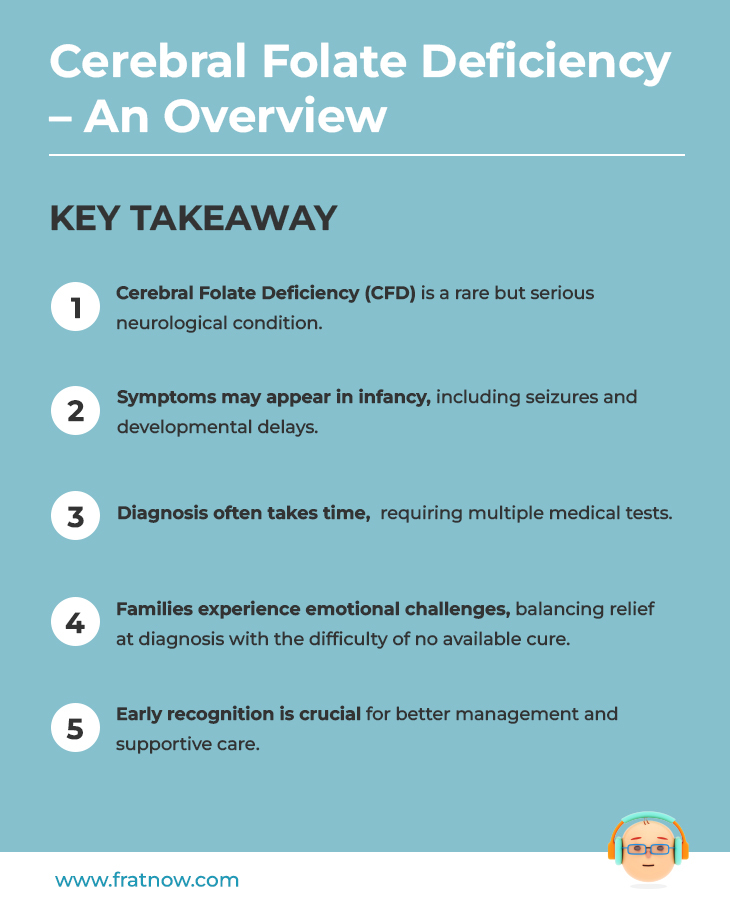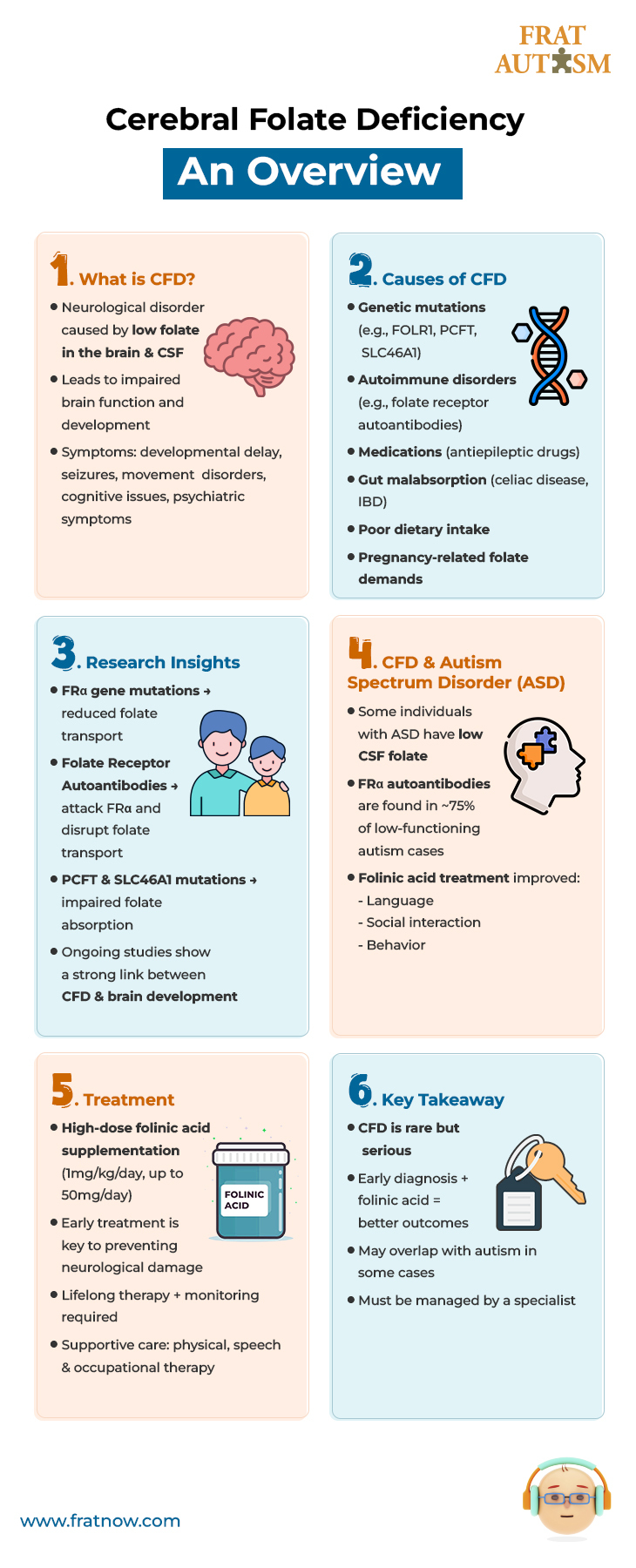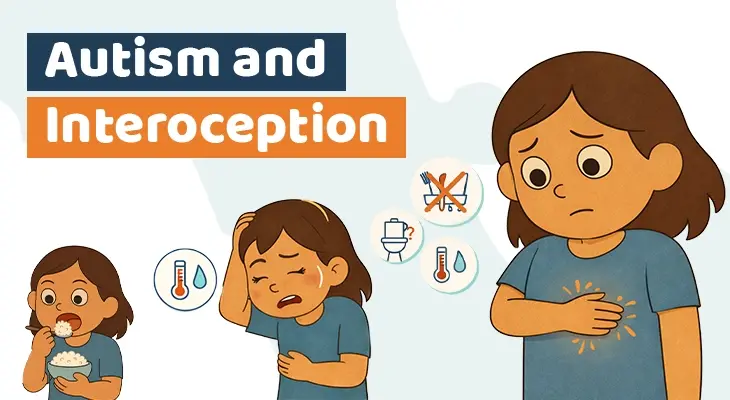
Download Download & share this Knowledge card in your network [Free Download]
Introduction
A family in the UK was devastated when their new-born son began to experience seizures and other developmental delays. After numerous tests, doctors finally diagnosed him with Cerebral Folate Deficiency (CFD). The family was relieved to finally have a diagnosis but struggled with the reality that there was no cure for their son’s condition.

Download Download & share this Knowledge card in your network [Free Download]
What is CFD?
Cerebral folate deficiency (CFD) is a neurological disorder characterized by low levels of folate in the cerebrospinal fluid (CSF) and brain tissue. This condition is believed to be caused by impaired folate transport into the brain, leading to a deficiency of folate in the central nervous system. The symptoms of CFD can vary widely, but often include developmental delay, cognitive impairment, movement disorders, seizures, and psychiatric symptoms such as depression and anxiety.
Causes of CFD
There are several known causes of CFD, including:
1. Genetic mutations:
CFD can be caused by mutations in genes involved in folate metabolism, such as the FOLR1 gene, which encodes the protein that transports folate into cells.
2. Autoimmune disorders:
Some cases of CFD are caused by autoimmune disorders that affect the absorption or transport of folate, such as autoimmune polyendocrine syndrome type 1.
3. Medications:
Certain medications, such as antiepileptic drugs, can interfere with folate absorption or metabolism and lead to CFD.
4. Malabsorption syndromes:
Conditions that affect the absorption of nutrients in the gut, such as celiac disease or inflammatory bowel disease, can lead to CFD.
5. Dietary deficiencies:
A diet low in folate can lead to CFD, particularly in individuals with impaired folate absorption or metabolism.
6. Pregnancy:
CFD can also occur during pregnancy due to increased folate demands, particularly in women with preexisting folate deficiencies.
Research studies on CFD
Research on CFD is ongoing, and several studies have explored the genetic and molecular mechanisms underlying this rare disorder. For example, a study by Ramaekers et al. (2015) identified mutations in the FRα gene in patients with CFD, and demonstrated that these mutations led to a reduction in folate transport into the brain. Another study by Pineda et al. (2005) identified mutations in the PCFT gene in patients with CFD, further highlighting the importance of this protein in folate transport.
The mutation can occur in a gene known as FOLR1, which encodes for the protein responsible for transporting folate across the blood-brain barrier. Another study identified a novel mutation in the SLC46A1 gene that is associated with CFD and provided insight into the role of the SLC46A1 protein in folate transport.
Relationship between CFD and Autism
There is evidence to suggest that cerebral folate deficiency (CFD) may be associated with autism spectrum disorder (ASD) in some individuals. Research has shown that a subset of individuals with ASD have low levels of folate in their cerebrospinal fluid (CSF) and respond positively to treatment with folinic acid, which suggests that CFD may be a potential contributor to the development of ASD in some cases.
One study published in JAMA in 2005 found that 75% of individuals with low-functioning autism had high levels of autoantibodies to the folate receptor alpha (FRα) in their CSF, which was associated with reduced folate transport into the brain and CFD. The same study also found that treatment with high-dose folinic acid led to significant improvements in language, social interaction, and behavior in some individuals with ASD.
Another study published in the Journal of Child Neurology (Zimmermann and Frye, 2016) found that a subset of children with ASD and language impairment had significantly lower levels of folate in their CSF compared to typically developing children. Treatment with high-dose folic acid resulted in significant improvements in language and communication skills in these children.
While the exact relationship between CFD and ASD is not fully understood, these studies suggest that CFD may play a role in the development of ASD in some individuals, particularly those with language impairment or low-functioning autism. However, it is important to note that CFD is a rare condition and not all individuals with ASD will have low levels of folate in their CSF.
Treatment of CFD
The treatment of cerebral folate deficiency (CFD) primarily involves supplementation with oral folinic acid, an active form of a reduced folate. Treatment should be initiated as early as possible to prevent or minimize neurological damage. The dosage of folinic acid varies depending on the severity of the deficiency, but typically ranges from 1mg/kilogram/daily to a sometimes maximum of 50 mg per day. This dosage range is generally determined on a case by case basis. The treatment is often lifelong and requires close monitoring of folate levels in the cerebrospinal fluid.
In some cases, treatment may also involve addressing the underlying cause of the deficiency, such as treating an autoimmune disorder or switching to medications that do not interfere with folate metabolism. Patients with CFD may also benefit from physical, occupational, and speech therapy to manage any neurological deficits and improve their quality of life.
It is important to note that CFD is a rare condition, and treatment should be managed by a qualified healthcare professional with expertise in the diagnosis and management of this disorder.
Conclusion
Overall, cerebral folate deficiency is a rare but serious condition that can have significant neurological and developmental consequences. Early diagnosis and treatment with high-dose folic acid supplementation are critical for improving outcomes in affected individuals.
For information on autism monitoring, screening and testing please read our blog.
References
- Frye, R. E., Sequeira, J. M., Quadros, E. V., James, S. J., Rossignol, D. A., & Zimmerman, A. W. (2013). Cerebral folate receptor autoantibodies in autism spectrum disorder. Molecular
- Li Y, Nowaczyk MJM, Giannopoulos PF, et al. Novel SLC46A1 mutations in patients with cerebral folate transport deficiency manifesting as complex neurological disorders. J Med Genet. 2019;56(8):541-547. doi:10.1136/jmedgenet-2018-105874
- Moretti, P., Sahoo, T., Hyland, K., Bottiglieri, T., Peters, S., Del Gaudio, D., … & Neul, J. L. (2012). Cerebral folate deficiency with developmental delay, autism, and response to folinic acid. Neurology, 78(7), 651-653.
- Pérez-Dueñas B, Serrano M, Montero R, et al. Cerebral folate deficiency: analytical tests and differential diagnosis. Expert Rev Neurother. 2017;17(1):37-46. doi:10.1080/14737175.2017.1261921
- Pineda M, et al. (2005). Cerebral folate deficiency and CNS inflammatory markers in Alpers disease. Mol Genet Metab, 84(4): 337-41
- Ramaekers, V. T., Sequeira, J. M., Blau, N., Quadros, E. V., & Selhub, J. (2015). Folate receptor autoimmunity and cerebral folate deficiency in low-functioning autism with neurological deficits. Neuropediatrics, 46(03), 172-176.
- Zimmerman, A. W., & Frye, R. E. (2012). Folinic acid-responsive seizures as a predominant manifestation of infantile cata- lectin deficiency syndrome. Journal of child neurology, 27(10), 1297-1301.




